Investor interest in Environmental, Social, and Governance (ESG) has grown rapidly in recent years, with approximately $8.4 trillion currently invested in ESG-related products.1 While this growth demonstrates progress for ESG investing, regulators and policymakers around the globe have begun focusing on ESG to protect investors and promote transparency for companies’ ESG practices.
Throughout 2022, the US Securities and Exchange Commission (SEC) prioritized regulations on climate change and ESG, promising new rules that would better inform and protect investors amidst the increased demand for these types of investments.
Although the SEC has not yet finalized these new regulations, companies have already begun prioritizing ESG opportunities and preparing future compliance efforts. These efforts have included:
This has also included voluntary disclosures to provide investors with more ESG related information than regulators may require.
On January 5, 2023, the SEC published its 2023 Rulemaking Agenda, calling out the following ESG priorities for the upcoming year:

1. The Enhancement and Standardization of Climate-Related Disclosures for Investors
When evaluating companies, investors continue to seek more information related to ESG including potential climate-related risks. This proposed rule will require registrants to include certain climate-related information in disclosures and annual reports to better inform investors of climate-related risks and related risk management processes, greenhouse gas emissions, climate-related metrics, and climate-related targets and goals.
2. Investment Company Names
As interest in ESG investment products and funds continues to grow, instances of misleading investors or ‘greenwashing’ have occurred, and it has become clear that commitment to ESG principles can vary greatly between investment funds regardless of how they are marketed to investors. This proposed amendment to the Fund ‘Names Rule’ will better protect investors from misleading or deceiving ESG claims by regulating the naming of funds, especially ESG or sustainable funds, more thoroughly.
3. Environmental, Social, and Governance Disclosures for Investment Advisers and Investment Companies
Currently, there is no consistent, comparable, and reliable framework for how Investment companies, funds, and advisors should be disclosing ESG strategies. This proposed rule will enhance and standardize the required disclosures regarding ESG factors for investment companies, funds, and advisors.
4. Human Capital Management Disclosures
With final rules on the horizon, SEC filers should begin preparing for compliance today. Although final versions of these rules could change, companies that proactively begin to evaluate their ESG strategies, including data, reporting & disclosures, with a focus on increasing clarity and transparency for investors will be best prepared to comply with any future ESG regulations.
In the near-term, companies should prioritize The Enhancement and Standardization of Climate-Related Disclosures for Investors, which is expected to be finalized later this month. A recent industry survey of 300 corporate executives found that 98% of respondents will begin compliance efforts even if the final rule is changed or delayed.7 SEC filers should stay ahead by beginning to:
To find out more about working with Capco and how we can help you overcome your ESG challenges, contact our expert team.
References
1 https://news.bloomberglaw.com/environment-and-energy/republicans-prepare-to-ramp-up-their-anti-esg-campaign-in-2023
2 www.sec.gov/rules/proposed/2022/33-11042.pdf
3 www.sec.gov/rules/proposed/2022/33-11067.pdf
4 www.sec.gov/rules/proposed/2022/33-11068.pdf
5 https://twitter.com/GaryGensler/status/1428022885889761292?s=20
6 https://www.reginfo.gov/public/do/eAgendaMain?operation=OPERATION_GET_AGENCY_RULE_LIST¤tPub=true&agencyCode&showStage=active&agencyCd=3235
7 ESG Today